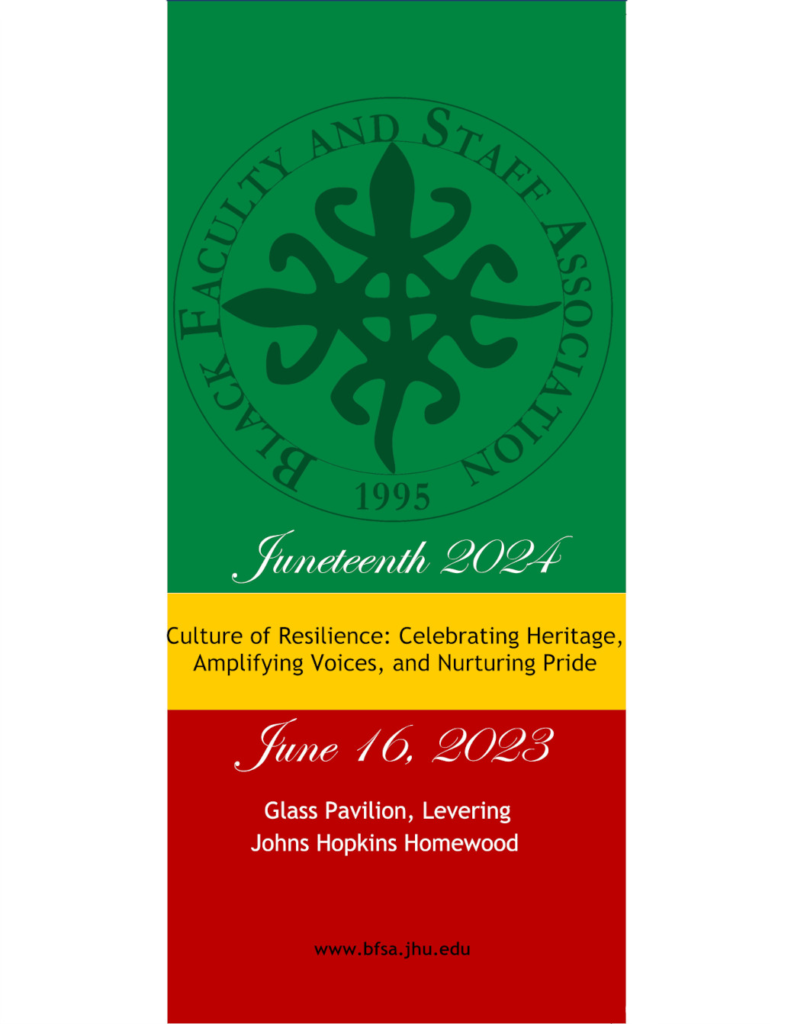Juneteenth 2024
Program Overview (download program pdf)
Lift Every Voice Buffet Brunch - Honoring Black Voices Through Time
- Doors Open: 10:30am; Program Begins – 11:00am
- Location: Levering Lounge & Great Hall
- Speakers: moderated by Dr. Jaky Banks, Ed '10 featuring Tiffany Wright, Esq., Deputy General Counsel, Dr. Lester Spence, Professor of Political Science and Africana Studies
Join the Hopkins community in celebration of Black History Month for Lift Every Voice Brunch - Honoring Black Voices Through Time. This event will honor the past, the present, and the future of the African American community. The past will feature a rich panel discussion, Turning Back the Clock: Examining Integration and Affirmative Action moderated by Dr. Jaky Banks, Ed ’10 featuring: Tiffany Wright, Esq., Deputy General Counsel, Dr. Lester Spence, Professor of Political Science and Africana Studies
Enjoy the culinary expressions of 3 Chef Caterers, a local black owned business.
Jerrell Bratcher, President, Black Faculty and Staff Association (BFSA) will emcee, along with a student performance rendered by the Melanotes.
Indispensable Role of Blacks (IRB) Induction Ceremony
- Doors Open: 1:30pm; Program Begins – 2:00pm
- Location: Great Hall and Levering Lounge
We will honor and celebrate the new inductees into the Indispensable Role of Blacks (IRB) Exhibit during our Annual Juneteenth Celebration, Showcase & Gala. This year marks the twenty-first anniversary of the IRB exhibition and the twenty-nineth year of the establishment of the BFSA.
Keynote: First Lady Dawn Flythe Moore, and First Black First Lady of the State of Maryland
Installation of the 2024 IRB Inductees: Honorable Judge Tameika Lunn, Adriene Breckenridge, Dr. Kenneth M Brown (posthumously), Anita Norton
Dedication & Installation of First Lady Dawn Flythe Moore
Juneteenth Celebration, Showcase & Dinner
- Doors Open: 4:30pm; Program Begins - 5:00pm
- Location: Glass Pavilion and Great Hall
- Performances by various groups
- 1st Keynote: Governor Wes Moore, 63rd and First Black Governor of the State of Maryland
- Dedication & Installation of Governor Wes Moore
- 2nd Keynote: Dr. Sherita Hill Golden, Hugh P. McCormick Family Professor of Endocrinology and Metabolism, Division of Endocrinology, Diabetes and Metabolism; Core Faculty, Welch Center for Prevention, Epidemiology, and Clinical Research; Core Faculty, Armstrong Institute for Patient Safety and Quality; Professor of Medicine; former Vice President, Chief Diversity Officer Johns Hopkins Medicine Office of Diversity, Inclusion, and Health Equity
As you are aware, Juneteenth holds great significance as a day of remembrance and celebration of freedom for all Americans.
This year, our Juneteenth festivities, are organized under the theme -
“Culture of Resilience: Celebrating Heritage, Amplifying Voices, and Nurturing Pride” that:
- emphasizes the importance of solidarity and collaboration across diverse communities in overcoming systemic barriers and fostering a more inclusive society.
- honors the legacy of resilience and perseverance of Black and Brown people of color throughout history, while also highlighting their ongoing contributions to shaping a brighter future.
- highlights the significance of Juneteenth as a day of remembrance and celebration of freedom, while also recognizing the ongoing struggle for equality and justice.
- underscores the power of collective action and advocacy in effecting meaningful social change and dismantling systems of oppression.
- celebrates the resilience and cultural heritage of Black and Brown communities, showcasing the beauty and diversity of their traditions and experiences.
Livestream Webinar link for all three programs:
https://jh.zoom.us/webinar/register/WN_ELGMCtrkRRS9pzUTdVvRdg
Co-Sponsored By:
the Black Faculty and Staff Association; Johns Hopkins University Office of the President; Johns Hopkins University & Medicine Development and Alumni Relations; Carey Business School Black Alumni Network; Society of Black Alumni; Johns Hopkins University Office of Diversity & Inclusion; Office of the General Counsel; Johns Hopkins University Office of Human Resources; Johns Hopkins Office of Government, Community & Economic Partnerships; Johns Hopkins Medicine Office of Human Resources; Johns Hopkins University Office of Finance and Administration; and Johns Hopkins University Office of the Provost
Lift Every Voice Buffet Brunch - Honoring Black Voices Through Time
 Dr. Jacqueline “Jaky” Banks, Ed ’10 hails from a rural small village called Allen, located on the Lower Eastern Shore of Maryland. Dr. Banks is an advocate, avid reader and author with published romance short stories, articles and books. Dr. Banks is a graduate of Towson University, Salisbury University, Johns Hopkins University and Drexel University.
Dr. Jacqueline “Jaky” Banks, Ed ’10 hails from a rural small village called Allen, located on the Lower Eastern Shore of Maryland. Dr. Banks is an advocate, avid reader and author with published romance short stories, articles and books. Dr. Banks is a graduate of Towson University, Salisbury University, Johns Hopkins University and Drexel University.
Over the years she has worked and had professional titles include college professor, K-12 advanced certified teacher, retail store manager, executive director, project director, consultant, director, chief, publisher, editor, columnist. Jaky has enjoyed a professional career that includes being a state level political appointee. Her books and writings all serve as tools to bring awareness, improve lives, spark dialogue, bring change.
 Tiffany R. Wright, JD joined Johns Hopkins University as Deputy General Counsel in May 2023. Prior to joining Hopkins, Ms. Wright served as Associate Counsel for Racial Justice and Equity to President Joe Biden. In that position, she provided strategic and legal advice to the President, Vice President, and senior White House advisors on a wide array of legal issues, including Title IX, gender and LGBTQ+ equity, reproductive rights, clemency, and religious liberty.
Tiffany R. Wright, JD joined Johns Hopkins University as Deputy General Counsel in May 2023. Prior to joining Hopkins, Ms. Wright served as Associate Counsel for Racial Justice and Equity to President Joe Biden. In that position, she provided strategic and legal advice to the President, Vice President, and senior White House advisors on a wide array of legal issues, including Title IX, gender and LGBTQ+ equity, reproductive rights, clemency, and religious liberty.
Prior to her White House service, Ms. Wright directed the Civil Rights Clinic at the Howard University School of Law, and practiced in the Supreme Court and Appellate practices at two international law firms. She served as a law clerk to Associate Justice Sonia Sotomayor on the U.S. Supreme Court, Judge David S. Tatel on the U.S. Court of Appeals for the D.C. Circuit, and Judge Royce C. Lamberth on the U.S. District Court for the District of Columbia.
Ms. Wright earned her law degree, magna cum laude, from the Georgetown University Law Center, and completed her undergraduate studies at the University of Maryland at College Park. Ms. Wright’s life and work have been profiled by the Washington Post, C-SPAN, USA Today, Reuters, and national podcasts.
The Johns Hopkins Melanotes is an all-gender a cappella group committed to celebrating the music of the African Diaspora and African-American Tradition with a focus on R&B/Soul, Hip-Hop, and Rap. The Melanotes wish to blend together a diverse array of sounds and offer a unique and enriching performance experience to Johns Hopkins and beyond. Through these performances, the Melanotes strive to authentically portray the complexity of the black experience and showcase the diversity of its members and Black music.
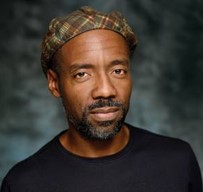 Dr. Lester Spence is a Professor of Political Science and Africana Studies specializing in the study of black, racial, and urban politics in the wake of the neoliberal turn, a form of liberalism that favors free-market solutions.
Dr. Lester Spence is a Professor of Political Science and Africana Studies specializing in the study of black, racial, and urban politics in the wake of the neoliberal turn, a form of liberalism that favors free-market solutions.
An award-winning scholar, author, and teacher, Spence has published two books. "Stare in the Darkness: Hip-hop and the Limits of Black Politics" won the 2012 W. E. B. Du Bois Distinguished Book Award. And "Knocking the Hustle: Against the Neoliberal Turn in Black Politics" won both the Baltimore City Paper and Baltimore Magazine 2016 Best Nonfiction Book Awards and was named to The Atlantic's 2016 "Best Books We Missed" list.
He has published over a dozen academic articles and several dozen essays and think pieces in a range of publications including The American Journal of Political Science, Political Research Quarterly, The New York Times, Jacobin, Salon, and The Boston Review. He is working on projects examining the contemporary AIDS crisis in black communities, and the growing role of police in major American cities.
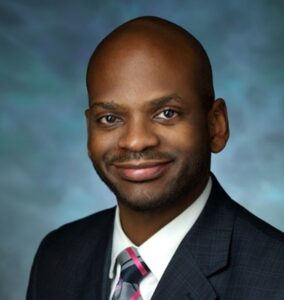 Jerrell Bratcher currently serves as the President of the Black Faculty and Staff Association (BFSA) at Johns Hopkins University, a role he assumed in July 2023. Since joining Johns Hopkins in 2016 within the Development and Alumni Relations department, Jerrell has been a pivotal figure in fostering principal gifts and leadership programs, demonstrating his commitment to both institutional and community development.
Jerrell Bratcher currently serves as the President of the Black Faculty and Staff Association (BFSA) at Johns Hopkins University, a role he assumed in July 2023. Since joining Johns Hopkins in 2016 within the Development and Alumni Relations department, Jerrell has been a pivotal figure in fostering principal gifts and leadership programs, demonstrating his commitment to both institutional and community development.
In 2017, Jerrell launched the Baltimore Youth De-Escalation and Juvenile Justice Initiative in partnership with Strategies for Youth (SFY) and various Johns Hopkins entities. This volunteer-led initiative brought together youth, police officers, states attorneys, DJS, magistrates, school admin, and community leaders to forge positive relationships and educate families, stakeholders, and partners about the juvenile justice system. His efforts were recognized with the prestigious Martin Luther King Jr. Award for Community Service in 2019.
Jerrell’s influence extends across numerous committees and advisory councils, including the JHU Roadmap Task Force Working Groups and collaborations with the Office of Government and Community Affairs, the Office for Economic Development, and Johns Hopkins in Action (JHiA). He also founded the Development and Alumni Relations (DAR) Diversity Advisory Council, known as DRIVE, which promotes diversity, race, inclusion, vulnerability, and equity within the Johns Hopkins community.
His exemplary community development work has earned him several awards, including the Johns Hopkins Diversity Leadership Council’s Diversity Recognition Award in 2019 and 2023, the CASE Accolades Gold Award for Marketing & Communications in 2020, and the inaugural BFSA Outstanding Community Service Champion Award. Jerrell Bratcher’s leadership and dedication continue to inspire and impact the Johns Hopkins community and beyond.
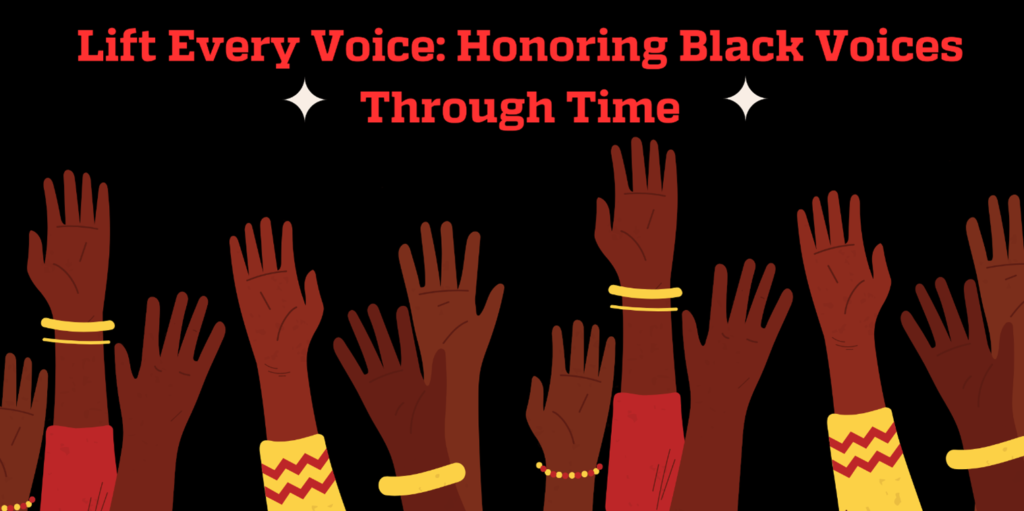
Disclaimer: The perspectives and opinions expressed by the speaker(s) during this program are those of the speaker(s) and not, necessarily, those of Johns Hopkins University and the scheduling of any speaker at an alumni event or program does not constitute the University’s endorsement of the speaker’s perspectives and opinions.
Annual Induction Ceremony
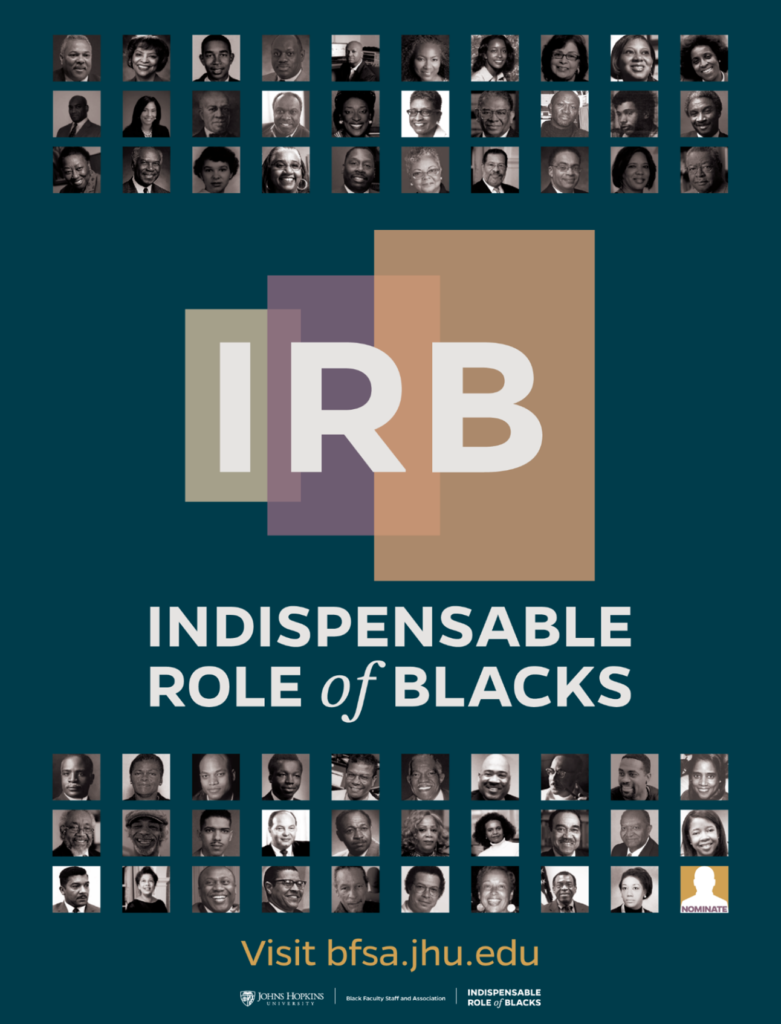
Friday, June 21, 2024
2:00pm-4:00pm
John Hopkins University
Levering - Great Hall
Baltimore, MD
Program
|
Welcome |
Lorraine Smith, IRB Co-Chair and 2023 IRB Inductee
Calvin L. Smith, Jr. IRB Co-Chair and Past-President, Black Faculty and Staff Association |
|
About the IRB and Introduction of the Keynote
|
Jerrell Bratcher, President, Black Faculty and Staff Association
|
|
Keynote Speaker
Induction Ceremony |
Dawn Flythe Moore First Lady of the State of Maryland Senior Policy Advisor
Lorraine Smith, IRB Co-Chair and 2023 IRB Inductee |
|
Introduction of Inductees |
Anita Norton Introduced by Sharon Morris, 2022 IRB Inductee Joined by Jazmine Eldridge and Randall Norton
Adriene Breckenridge Introduced by JHU Alumni Jasmine Bridges
Kenneth Brown, MD (posthumously) Receiving In Honor Terese Thomas
The Honorable Tameika M. Lunn Introduced by Calvin Smith, Jr., IRB Co-Chair and BFSA Past-President
|
|
Acknowledgement of Inductees |
Calvin Smith, Jr., IRB Co-Chair and BFSA Past-President |
|
Closing Remarks |
Lorraine Smith, IRB Co-Chair and 2023 IRB Inductee |
DAWN FLYTHE MOORE
First Lady of the State of Maryland
Senior Policy Advisor
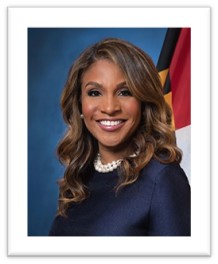 Dawn Flythe Moore is the First Lady of the State of Maryland.
Dawn Flythe Moore is the First Lady of the State of Maryland.
With more than 20 years of leadership experience in government relations, non-profit work, building corporate partnerships, community organizing, campaign strategy, and fundraising, she is passionate about empowering women, fostering economic opportunity, and championing the arts.
She has held positions in the highest levels of state government and has served on the board of non-profit organizations including Maryland’s State Theatre, Baltimore Center Stage, and iMentor, which partners with high schools in communities where the majority of students served will be first-generation college graduates.
She also served as chair of the Moore-Miller Inaugural Committee, whose inclusive efforts contributed to a reported 30 to 40 percent increase in business for Black-owned businesses during the week of Governor Moore’s inauguration, supported 34 jobs with minority-, women- and locally owned businesses, and generated more than $1.5 million in labor income.
The First Lady and Governor Wes Moore together established the Moore Family Foundation to make impact grants to local nonprofits, to provide thought leadership and organizational support and to create partnership alliances with community stakeholders, government entities and other philanthropic partners that are committed to place-based initiatives in Baltimore City. Under her leadership, the Moore Family Foundation has invested strategically in education, community enrichment, health research and development, veterans organizations, and the arts.
A graduate of the University of Maryland College Park, Dawn holds a degree in Government and Politics and a certificate in Women’s Studies.
ADRIENE BRECKENRIDGE
Academic Advisor and Campus Minister
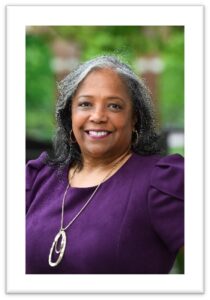 When Adriene Breckenridge walked into her retirement party in January 2024, she was surprised to see a row of faces from her past: former students she’d worked with closely during her 28 years as an academic advisor and campus minister at Johns Hopkins University.
When Adriene Breckenridge walked into her retirement party in January 2024, she was surprised to see a row of faces from her past: former students she’d worked with closely during her 28 years as an academic advisor and campus minister at Johns Hopkins University.
The JHU alumni bestowed Breckenridge with testimonials on how she’d affected their lives and careers, with two of them performing the Gospel song “You Are My Hero.”
“I was crying the whole time,” Breckenridge says.
Breckenridge first joined Johns Hopkins in 1995 after finishing seminary school. Her role was one the Black Student Union had explicitly urged for a few years earlier, seeking an academic advisor on staff who could relate to them. “It’s very typical for Black students to feel like they have nowhere to go in that environment, and I could provide a home,” says Breckenridge, who’s often called “Ms. B” or “Rev. B.”
In this role, Breckenridge would meet with dozens—during some semesters, up to 150—freshmen each semester, coaching them on their academic success and future career paths.
Becoming aware of a glaring deficit in the health fields, Breckenridge helped launch the Minority Pre-Health Conference at Johns Hopkins in 1999. For 11 years, the event—considered a precursor to JUMP—offered workshops and networking opportunities for students underrepresented in jobs in health and medicine. At the peak more than 150 students were participating, and 55 schools with health programs.
In the conference’s later years, Breckenridge would sometimes see students who’d once attended come back as physicians, nurses, or dentists ready to mentor. “That was the coolest thing ever,” she says.
Breckenridge was also a lifetime member of the Black Faculty and Staff Association at Hopkins, participating since its 1995 inception. She held various leadership roles in the group, including Homewood caucus rep, secretary of the executive board, chair of professional development, and parliamentarian.
Along with her academic support Breckenridge provided a spiritual home base for Hopkins students who sought it. She served as an advisor to the JHU Gospel Choir and launched a Bible study group that eventually formalized as the Beloved College Community Fellowship, holding worship services in Shaffer Hall every Sunday. The effort lasted from the late 1990s until the COVID-19 pandemic. “We’d always do a big dinner Easter Sunday,” Breckenridge says.
Born and raised in Washington, Breckenridge earned her bachelor’s in psychology at the University of Washington, then her master’s of divinity from Howard University. She earned her master’s in clinical counseling at Johns Hopkins while working there, as well as a certificate in human-centered life design, among others. At Hopkins, she also served on the board of the chaplain and as an advisor to the JHU Gospel Choir.
Breckenridge says she didn’t realize the dent she’d made at Johns Hopkins until she retired, when so many people from the past emerged to thank her. “I was thrilled at this point of my career to see this,” she says. “I feel like my work was not in vain.”
DR. KENNETH BROWN
Mentor and Physician
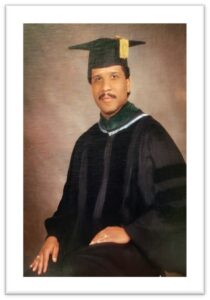 In 1966, Kenneth Brown was the starting defensive lineman at Johns Hopkins University, a young man from New York on his path to study medicine. He was also one of only a few Black students at the university at the time, and his attempt to get a haircut inadvertently sparked a social justice movement.
In 1966, Kenneth Brown was the starting defensive lineman at Johns Hopkins University, a young man from New York on his path to study medicine. He was also one of only a few Black students at the university at the time, and his attempt to get a haircut inadvertently sparked a social justice movement.
When Brown approached a barbershop in The Marylander building, the manager refused him service and used a racial slur. Inflamed by the incident, a group of about 75 Hopkins students congregated under Brown’s lead. They delivered an ultimatum to the shop: Start serving Black clients, or face picketing and boycotting of the business.
The pressure led to change, with the barbershop ultimately welcoming the Black students and residents of Charles Village and hiring a Black barber. Brown’s experience is considered a precursor to the founding of the Black Student Union on the Hopkins campus three years later.
“In those days there were essentially no African American faculty members at Hopkins, and Black students like me looked up to those ahead of us to lead the way,” said one friend, Robert Hyde III, at Brown’s 2022 memorial service. “Ken was easy to like and admire.”
Born in Jamaica, Queens, in 1949, Brown aspired to become a physician from an early age. After graduating from Johns Hopkins in 1970, he studied medicine at Tufts University, where he was an organizer and president of the Student National Medical Association, a support group for underrepresented medical school students.
In his adult life, Brown settled in Washington, D.C., where he became the first Black gastroenterologist at the Washington Hospital Center, then chief of gastroenterology at Providence Hospital. He also set up his own private practice in 1981, and in the 2000s established the independent surgery center Capital Endoscopy, now operated by MedStar Health.
“There was no doubt that his compassion for the health needs of citizens of the District was not only passionate but informed,” recalled mentor and friend Vivian Pinn at Brown’s memorial. “All you had to do was to bring up the topic of declining medical facilities in some quarters of the District to receive … a very intense and most concerned discourse on the politics, disparities, and needs of those communities.”
Brown married Terese Thomas Brown, also a physician, in 1985, and together they raised three daughters.
Family and friends remember Brown as an adventurous world traveler, amateur historian, masterful chef, engaged activist, and devoted husband, father, and grandfather. At his memorial service, several peers from Brown’s time at Johns Hopkins showed up, recalling his strength as a student and an athlete (he played basketball and lacrosse in addition to football) as well as his humor and steady friendship.
Following her husband’s death, Terese took over his former vehicle. “I’d never noticed before,” she says, “but I realized he still had the Hopkins Blue Jay sticker on his plates.”
THE HONORABLE TAMEIKA M. LUNN
District Court Judge
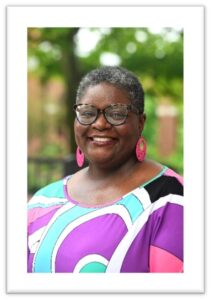 When Tameika Lunn graduated with dual degrees from Johns Hopkins University and the Peabody Conservatory of Music in 1999, her family’s story was featured in The Baltimore Sun. Born to teenage parents in East Baltimore who struggled to make ends meet, Lunn had defied all odds to earn her two degrees.
When Tameika Lunn graduated with dual degrees from Johns Hopkins University and the Peabody Conservatory of Music in 1999, her family’s story was featured in The Baltimore Sun. Born to teenage parents in East Baltimore who struggled to make ends meet, Lunn had defied all odds to earn her two degrees.
Now facing a crossroads between music and law, Lunn chose the latter, leading to a career dedicated to serving her home city of Baltimore. In 2022, then-Governor Larry Hogan appointed Lunn as an associate judge in the District Court of Baltimore City. She now serves as the presiding Judge of the Baltimore City Adult Recovery Court in the District Court (ARC).
Initially, Lunn was concerned about the emotional toll of serving in the ARC, which provides drug and alcohol treatment, mental health services, and other resources to residents charged with misdemeanor crimes. “I thought it might hit too close to home,” says Lunn, who lost her brother, David Lunn Jr., to a fentanyl overdose in 2019 and whose father, David Lunn Sr., is a 30-year recovering addict.
But over a year into the job, Lunn says she “has not regretted a single day”—and has found that her personal experience only benefits her work. “I realized the recovery court needed a judge with a true understanding of addiction,” she says. “Not only someone who could be firm … but also someone who, in their heart of hearts, understands how addiction affects people and their families.”
Lunn emphasizes that addiction “has no face, does not discriminate and can happen to anyone.” Her brother David was a Division I college athlete who graduated and traveled overseas playing professional basketball.
“I tell my clients … I know this is hard, I know this is scary, but come in and be honest and we’ll get through it,” she says. “I share my story, and it helps.”
Growing up in Baltimore, Lunn attended Harford Heights Gifted and Talented Education Center and the Bryn Mawr School for Girls, which nurtured her talents in singing and classical music. Performing in the city, she found a mentor in Judge Bonita Dancy of the Circuit Court of Baltimore City, who introduced Lunn to “a circle of powerful Black women judges and lawyers who really impressed me,” she says.
As a student at Johns Hopkins, Lunn enjoyed “literally the best of both worlds,” pursuing a degree in voice performance with an opera certificate at Peabody while earning a history degree on the Homewood campus. She next studied law at George Washington University, where she served as a student attorney for domestic violence victims and participated in the Black Law Students Association.
Lunn completed her judicial clerkship with Judge Dancy before working as a civil and insurance defense attorney for firms in D.C. and Baltimore. In 2011, she was appointed as an administrative law judge in the Maryland Office of Administrative Hearings.
Though she set her stakes in a legal career, Lunn, a mother of three, also remains passionate about music. “I wake up to music and go to sleep to music,” she says. “And my kids are very musical, so I get to experience it through them.”
Anita Norton
Collaborator and Advocate
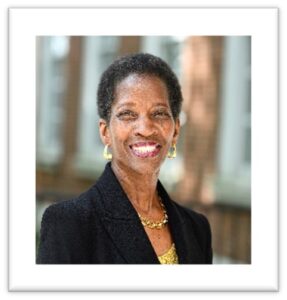 For Anita Norton, becoming an honoree in The Indispensable Role of Blacks exhibit at Johns Hopkins is a full-circle moment: The project is one she helped shape more than a decade ago, as part of her advocacy with the Black Faculty and Staff Association (BFSA).
For Anita Norton, becoming an honoree in The Indispensable Role of Blacks exhibit at Johns Hopkins is a full-circle moment: The project is one she helped shape more than a decade ago, as part of her advocacy with the Black Faculty and Staff Association (BFSA).
“I’m humbled by it,” says Norton, who retired in 2023 as director of the Online Services Program in the Sheridan Libraries’ Entrepreneurial Library Program. “It’s a distinguished award, and I recognize the caliber of people honored.”
When Norton first joined Johns Hopkins in 2005 as a distance learning librarian, she noticed a scarcity of Black employees in professional roles. She found her way to the BFSA, becoming a core part of what she describes as “a small, lively group of movers and shakers who had an interest in ensuring the campus was equitable for all, and who were willing to stick their necks out.”
Over time Norton took on a variety of leadership roles within the BFSA, including Homewood caucus representative, recording secretary, and parliamentarian. In her early years she steered the group’s African American Book Festival and collaborated on many other events.
With colleague Sharon Morris, Norton helped organize a traveling exhibit called The History of African Americans at Johns Hopkins, acknowledging Black trailblazers of the university’s past and present. “The idea came about because the BFSA saw that when people came to Johns Hopkins campuses and looked at photos or portraits on the wall, almost none displayed African Americans,” Norton says.
Eventually, Norton and Morris saw a need to increase the exhibit’s visibility and scope, re-envisioning it as The Indispensable Role of Blacks. The project debuted in 2012 as both a free-standing and online exhibit, honoring notable Black alumni, faculty, staff, and students from Hopkins.
Growing up in Queens, New York, Norton had witnessed the effects of discrimination from an early age. When her father opened a business in a majority-white part of Long Island, its entrance was splattered with the letters KKK. “I saw the impact of lack of tolerance,” she says. “So, I’ve always wanted to do things that would break down barriers and promote greater tolerance of our differences.”
Norton attended Morgan State University, then earned her master’s in library and information science at the University of Pittsburgh. She worked in library services for Baltimore City Schools and at Harford Community College before joining Johns Hopkins, where she worked for 18 years.
In 2010, Norton became manager of the Entrepreneurial Online Library Program, overseeing an external library whose long-term contract generated revenue for the Sheridan Libraries. “I encountered educators and students from many cultures, and it was important that my staff maintained a high level of tolerance and excellence,” says Norton, who relied on her innate enthusiasm and collaborative skills.
In this role, she established the Exploring Series, a set of workshops for librarians diving into trends in the field. She also took part in the Diversity Committee at the Sheridan Libraries, and in 2018 co-curated the exhibit Freedom Papers: Black Assertions from the Archives.
In June 2024, Norton takes her place among the honorees she has celebrated through The Indispensable Role of Blacks, a group now numbering over 90.
“It feels wonderful to receive my roses,” she says.
Acknowledgements
We wish to thank the many people who played significant roles in advising and supporting the BFSA, the IRB project, and the many initiatives that promote the legacy, leadership, work, advocacy, history, and contributions of BIPOC members across the Johns Hopkins enterprise. In addition to contributions from BFSA members, the Office of the President, and the Office of Diversity and Inclusion, we wish to thank…
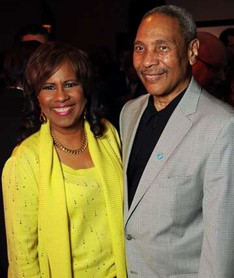 Dr. John F. Guess, Jr., A&S ’71, SAIS ’76, Member, Fred Scott Brigade; CEO, Houston Museum of African American Culture; Managing Consultant, Guess Group, Inc.
Dr. John F. Guess, Jr., A&S ’71, SAIS ’76, Member, Fred Scott Brigade; CEO, Houston Museum of African American Culture; Managing Consultant, Guess Group, Inc.
Businessman and noted arts patron John Guess emerged as a fierce and unflinching advocate for civil rights in the late 1960s, when he played a central leadership role in establishing Johns Hopkins University's Black Student Union on the Homewood campus. He was the first Black Student Union chairman and the first Black president of the university's student council. In the years since, Dr. Guess has proved to be an instrumental partner of the university in helping generations of Black students thrive, as he did, at Hopkins. He is also an enthusiastic collector of contemporary, glass, and African American art and the driving force behind the resurgence of the Houston Museum of African American Culture, where he serves as CEO.
Dr. Guess has generously sponsored the IRB project, in addition to the Black Faculty and Staff Association (BFSA) and the Black Student Union (BSU), as one of the leading spokespersons and founders, alongside classmate Bruce Baker. A native of Houston, Dr. Guess became the first Black Student Union chairman and the first Black president of the university’s student council. He is chief executive officer of the Houston Museum of African American Culture, managing consultant at The Guess Group Inc., a real estate services company and a Partner in the Dallas-based Access Seminars and Consulting Services. He is an active art collector whose works have been shown in museums across the country and in Europe. John Guess received an honorary Doctorate degree from the University in 2023.
|
Special Thank You to the IRB Nomination Review Committee |
||
|
Jerrell Bratcher |
Calvin Smith, Jr |
Lorraine Smith |
|
Allison Seyler |
Dr. Katrina Caldwell |
|
|
Special Thank You to the following Sponsors & Partners |
||
|
The Office of the President of Johns Hopkins University The Office of the Provost and Chief Academic Officer of Johns Hopkins University The Office of the Vice Provost for Diversity and Inclusion and Chief Diversity Officer Johns Hopkins & Medicine Development and Alumni Relations Office of Government, Community, and Economic Partnerships Office of Senior Vice President, Human Resources, Johns Hopkins Medicine Office of Human Resources, Johns Hopkins University Office of the General Counsel And everyone who has supported this project and exhibition throughout the years! |
||
Juneteenth Celebration, Showcase, & Dinner
WES MOORE
63rd Governor of the state of Maryland
First Black Governor of Maryland, Black Politician, Combat Veteran, Businessman, Best-Selling Author, Anti-Poverty Advocate, Philanthropist, Rhodes Scholar, Small Business Owner, and former CEO
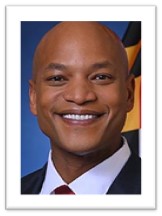 Wes Moore is the 63rd Governor of the state of Maryland. He is Maryland’s first Black Governor in the state’s 246-year history, and is just the third African American elected Governor in the history of the United States.
Wes Moore is the 63rd Governor of the state of Maryland. He is Maryland’s first Black Governor in the state’s 246-year history, and is just the third African American elected Governor in the history of the United States.
Born in Takoma Park, Maryland, on Oct. 15, 1978, to Joy and Westley Moore, Moore’s life took a tragic turn when his father died of a rare, but treatable virus when he was just three years old. After his father’s death, his family moved to the Bronx to live with Moore’s grandparents before returning to Maryland at age 14.
Moore is a proud graduate of Valley Forge Military Academy and College, where he received an Associate’s degree in 1998, and was commissioned as a second lieutenant in the U.S. Army. Afterward, he went on to earn his Bachelor’s in international relations and economics at Johns Hopkins University in Baltimore, where he graduated Phi Beta Kappa.
While at Johns Hopkins, Moore interned in the office of former Baltimore Mayor Kurt Schmoke. Moore was the first Black Rhodes Scholar in the history of Johns Hopkins University. As A Rhodes Scholar, he earned a Master’s in international relations from Wolfson College at Oxford.
In 2005, Moore deployed to Afghanistan as a captain with the 82nd Airborne Division, leading soldiers in combat. Immediately upon returning home, Moore served as a White House Fellow, advising on issues of national security and international relations.
In 2010, Moore wrote “The Other Wes Moore,” a story about the fragile nature of opportunity in America, which became a perennial New York Times bestseller. He went on to write other best-selling books that reflect on issues of race, equity, and opportunity, including his latest book “Five Days,” which tells the story of Baltimore in the days that followed the death of Freddie Gray in 2015.
Moore built and launched a Baltimore-based business called BridgeEdU, which reinvented freshman year of college for underserved students to increase their likelihood of long-term success. BridgeEdu was acquired by the Brooklyn-based student financial success platform, Edquity, in 2018.
It was Moore’s commitment to taking on our toughest challenges that brought him to the Robin Hood Foundation, where he served for four years as CEO. During his tenure, the Robin Hood Foundation distributed over $600 million toward lifting families out of poverty, including here in Maryland.
While the Robin Hood Foundation is headquartered in New York City, Wes and his family never moved from their home in Baltimore.
Moore has also worked in finance with Deutsche Bank in London and with Citigroup in New York.
SHERITA HILL GOLDEN, MD, MHS
Physician-Scientist Confronting Social Inequities
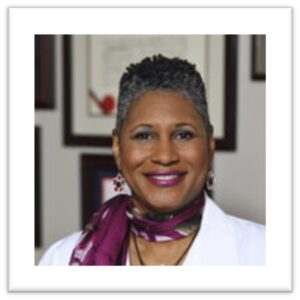 Hugh P. McCormick Family Professor of Endocrinology and Metabolism, Division of Endocrinology, Diabetes and Metabolism; Core Faculty, Welch Center for Prevention, Epidemiology, and Clinical Research; Core Faculty, Armstrong Institute for Patient Safety and Quality; Professor of Medicine; former Vice President, Chief Diversity Officer Johns Hopkins Medicine Office of Diversity, Inclusion, and Health Equity
Hugh P. McCormick Family Professor of Endocrinology and Metabolism, Division of Endocrinology, Diabetes and Metabolism; Core Faculty, Welch Center for Prevention, Epidemiology, and Clinical Research; Core Faculty, Armstrong Institute for Patient Safety and Quality; Professor of Medicine; former Vice President, Chief Diversity Officer Johns Hopkins Medicine Office of Diversity, Inclusion, and Health Equity
During medical school, Sherita Hill Golden “developed a passion for inner city medicine,” particularly relating to diabetes among people of color. When she arrived in East Baltimore for her residency in July 1994, the young doctor appreciated the presence of so many Black support staff. “They were very proud when they saw a Black doctor, even if you were an intern,” she recalled. “If you stepped on the elevator and they saw the M.D., they were like, ‘Oh, Dr. Hill, I hope you’re having a good day.’ They would walk you to your car at night to be sure you were safe. They would make sure at holidays that you had food.” In fact, it was a unit clerk who introduced her to her future husband, pediatrician and neonatologist Dr. Christopher Golden. “One of the things that makes Hopkins such a special place is not just the intellectual capital of the faculty but the dedication of the staff, it’s those human relationships that people don’t always see that make a difference for many of us here.”
Golden’s principal clinical and research interest is understanding the effects of chronic psychological stress “whether it’s from racism, depression, or environmental influences, and how that increases a person’s risk for diabetes and heart disease.” Recognizing a correlation between chronic stress and depression and the risk of developing diabetes, she employed the tools of population science to identify novel hormone risk factors as contributors to diabetes. “As a teacher, I wanted to train other physician-scientists how to study the hormonal risk factors in large populations because once you’ve figured out the risk factors, the next question is, how do you develop interventions to change hormonal responses to prevent or treat diabetes?” The system of checks and balances now in place for patients with diabetes throughout the Johns Hopkins Health System resulted directly from Golden’s clinical, research, and educational efforts.
When Freddie Gray was arrested in April 2015, Dr. Golden had been on the faculty for twenty years and executive vice chair of the Department of Medicine for two months. With her department chair’s support, she initiated a Journeys in Medicine discussion series to promote honest dialogue about everyday lived experiences of racial injustices faced by doctors, nurses, administrators, and support staff from minoritized communities. The department also welcomed East Baltimore civic leaders who directed conversations with medical faculty and staff and explained that members of the community sometimes felt they were treated with disrespect when they came into the hospital. They conveyed the community’s willingness to participate in research projects, but admonished, “don’t disappear when it’s over, take the resources, and never tell us what happened.” The series inspired major changes in the Department of Medicine.
In her current role as vice president and chief diversity officer for all of the Johns Hopkins Medical Institutions, Golden partners with administrative peers on other Hopkins campuses to align their approach to diversity awareness training for all staff and students. “After the murder of George Floyd, we worked together across the university and Johns Hopkins Medicine to understand the contribution of structural racism on society,” she recalls. “Just the concepts: What does structural racism look like in health care, in housing, in education?” Similarly, she and her team collaborate with the Office of Government and Community Affairs to support workforce diversity and health equity initiatives, and frequently testify before legislative committees as content experts on various related subjects. “We need more race and ethnic diversity, but we are making progress,” Golden recognizes. “If you treat everybody the same, inequity will persist because everybody needs something different. We aren’t all starting at the same place.”
Introduction of the Griot Jerrell Bratcher, BFSA President
Call to the Ancestors Gordon "Soorah" Parks, the Griot
Welcome and Introduction of Keynote Jerrell Bratcher, BFSA President
Keynote Address Wes Moore, 63rd Governor of the state of Maryland
Musical Selections Singing Sensation Youth Choir
Invocation Rev. Dr. Ivan Brooms, Word of Life International Church
Dinner catered by Yai and Toya Cuisine
Acknowledgement of the IRB Inductees Calvin Smith and Lorraine Smith, IRB Co-Chairs
2024 IRB Inductees:
Governor Wes Moore
First Lady Dawn Flythe Moore
Adriene Breckenridge
Dr. Kenneth M Brown *posthumously*
Honorable Tameika Lunn
Anita Norton
Introduction of Keynote Jerrell Bratcher, BFSA President
Keynote Speaker Sherita Hill Golden, MD, MHS
Juneteenth Performances Brinae Ali and Friends
Acknowledgements & Closing Remarks Mia Brooms, BFSA Events Director
Celebration through dance DJ Rod Madd Flava
Kids' STEM activities provided by Center for Educational Outreach
Balloon designs by FaceWorks (located in Levering Lounge)
Thank you to all of the minority and black-owned businesses, vendors, partners, and sponsors for making this program a great success!
Thank You to the Small, Minority, and Black-owned businesses who made this extraordinary program possible!
Caterers:
Taste This Catering https://www.tastethisbaltimore.com/
3 Chef’s Catering [email protected]
Xquisite Catering LLC (GS 10KSB Alum) https://www.xquisitecateringllc.com/
Yai & Toya’s Cuisine www.instagram.com/yaiandtoyascuisine
Entertainment:
Singing Sensations Youth Choir, Inc. https://www.sensationalsingersmd.org/
Dr. Hollie Hood-Mincey Director
Alexandria “Brinae Ali & Friends” Bradley http://brinaealimusic.com/
Gordon “Soorah” Parks, the Griot 410-655-2118, [email protected]
DJ Rod Madd Flava “Madd Flava Entertainment” https://rodmaddflava.com/
Face Works by Annette Abramson www.faceworksevents.com
Decorations/Florals/Awards:
Something Unique by Vanessa Anderson [email protected]
Let’s Do Linens, Inc https://www.letsdolinens.com/
Awarding You https://www.awardingyou.com/
Graphics Design and Printing:
Mitchell & Sennaar Communications, Inc., (443) 630-3477, [email protected]
Black Classic Press/BCP Digital Printing https://www.agooddaytoprint.com/
A/V, Communications, and Media:
JHU KIT-CATS
JHU Office of Communications, photographer Will Kirk
Kathryn Pearce freelance writer
This Juneteenth and beyond, let’s honor the past by building a better future, ensuring that the principles of freedom and equality are reflected in our everyday actions. Together, we can make a difference all year round.
Supporting Black-owned and minority-owned businesses is not just a transaction—it's a commitment to fostering a more inclusive and equitable society.
